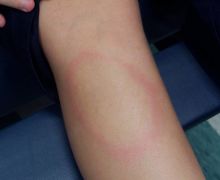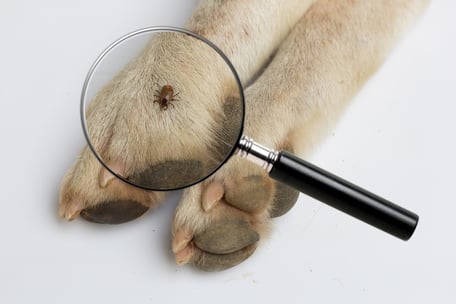Tick populations are rapidly advancing in New Jersey and Pennsylvania this year, more so than in past recorded seasons. Due to the mild winter we experienced, ticks did not die off in large quantities as in the past, resulting in a boom of ticks throughout the region. Our clients are depending on our tick expertise more so than in the past and the effective preventative services that Cooper has to offer.
Where do ticks live?
In all likelihood ticks live near you. Ticks live in places such as unmanicured lawns, brush, along wood lines, tall grasses, fields, and parks. Areas with an abundance of tall foliage are conducive to tick activity, giving them a perfect place to latch onto while waiting for a host. When humans or animals such as pets walk through these areas of dense growth, ticks cling onto exposed skin to feed off of their new host. New Jersey and Pennsylvania are no exceptions, having one of the highest tick populations this season than ever before.
What do tick bites look like?
Several tick-borne diseases can be transmitted to the host that they choose. Tick symptoms can manifest in several ways depending on the particular illness and the type of tick.
Lyme disease
Tick bites resulting in Lyme disease can look like a red bullseye rash on your skin as pictured below. Evidence of Lyme disease can also cause part of your face to droop, mimicking stroke symptoms. Lyme disease in NJ and PA while familiar in the past is becoming more of a concern this year.

Photo Credit: lymedisease.org
If you think you may have Lyme disease, follow this symptom checker provided by lymedisease.org for more clarity.
Tick head
Sometimes you may physically see a tick head imbedded into your skin. This does not always indicate the transmission of an infection or disease. Regardless of your symptoms or lack of, identifying and removing the tick as quickly as possible is necessary in avoiding diseases.
What is the Powassan Virus?
The Powassan virus has been reported on much more in our area this year, subsequently increasing anxieties due to the serious nature of the virus. There is no known cure or vaccine to treat Powassan virus. Fatalities occur approximately 10% of the time with an incubation period of about 3 hours after the tick latches onto its host. The virus is very difficult to detect and remove in time for the individual to avoid contracting Powassan virus in NJ or Powassan virus in PA. According to Dr. Richard Cooper, “There have only been 4 cases in New Jersey and Pennsylvania, but experts are concerned that the number of cases could rise given the explosion of ticks this year.”
To learn more about tick-borne diseases and illnesses, read Dr. Richard Cooper’s NJ and PA tick update here.
How can I remove a tick?
Trusting online message boards or getting tips from your friends and family can be dangerous when it comes to tick removal. Please follow our guide to ensure that you are treating the situation safely and effectively.
What not to do:
- Petroleum jelly or nail polish– This will not make the tick any easier to remove. Ticks embed into a host with their mouths which are not likely to unlatch or dissolve by using this method.
- Excessive heat– Using excessive heat could cause parts of the tick to break off such as its mouth, leaving parts in your skin that are open to infection.
- Using your hands – Not only is this extremely difficult, but you may squeeze the tick and release its infectious bodily fluids.
What you should do:
The CDC suggests the following steps to remove a tick.
Photo Credit: The Center For Disease Control (CDC)
- Tweezers - Use fine-tipped tweezers to grasp the tick as close to the skins surface as possible.
- Pull gently - Pull upward with steady, even pressure. Don't twist or jerk the tick; this can cause the mouth-parts to break off and remain in the skin. If this happens, remove the mouth-parts with tweezers. If you are unable to remove the mouth easily with clean tweezers, leave it alone and let the skin heal.
After removing the tick, thoroughly clean the bite area and your hands with rubbing alcohol, an iodine scrub, or soap and water.
Dispose of a live tick by submersing it in alcohol, placing it in a sealed bag/container, wrapping it tightly in tape, or flushing it down the toilet. Never crush a tick with your fingers.
How do dogs get ticks?

Dogs are just as venerable as humans to tick bites and infections. Spending time at dog parks, in backyards, and taking walks in the woods with their humans makes them exposed. Unlike humans, dogs are not clothed and walk lower to the ground, exposing nearly all of their body at all times. It is very important that you check your dog for tick symptoms and bites after spending time outdoors.
How can I prevent ticks in my yard?
Cooper Pest Solutions offers a Tick Reduction service near you to help prevent ticks from entering your property. Our methodology prevents ticks from entering into your yard by providing targeted applications in areas where ticks live and breed. Unlike other NJ tick service companies, our tactics do not involve spraying your entire property with chemicals. Our method is to treat the un-manicured areas around your home - mulch, groundcover, leaf litter, and any other overgrown area. We will also treat the perimeter of your yard and 5 feet into the turf which will prevent ticks from migrating into your yard. Not only is our treatment more effective, but it is also more environmentally conscious since our treatment uses less pesticide.
If you are concerned about ticks on your property, please give us a call at 1-800-949-2667 or fill out the form on our website for a Free no-obligation evaluation.

